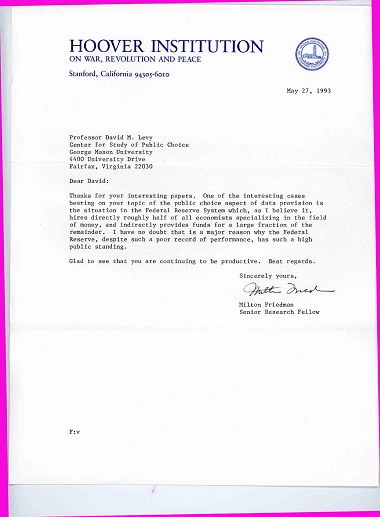
Does money influence research outcomes? We’re used to hearing this question when it comes to pharmaceutical research and the same question is surely relevant to research in monetary economics. Central banks like the Fed, the ECB, and the BoE do a lot of hiring, sponsor a lot of conferences, pay a lot of honoraria. Might people be reluctant to bluntly criticize the hand that feeds them?
for full size image):
…[T]he Federal Reserve System…as I believe it, hires directly roughly half of all economists specializing in the field of money…I have no doubt that this is a major reason why the Federal Reserve, despite such a poor record of performance, has such a high public standing.
Fed-sponsored research generally adheres to a high level of scholarship, but it does not follow that institutional bias is absent or that the appropriate level of scrutiny is zero.

READER COMMENTS
Chris Koresko
Dec 11 2012 at 8:04pm
More generally, how much is the opinion of the typical “public” economist (defined as someone whose views are influential in formulating government policy and/or public opinion) influenced by the political climate?
My impression that the answer is, “very strongly”. There are obvious examples of people in recent years whose positions as members of the federal government appear to contradict the conclusions they reached in academia.
There are also broader trends, like the resurgence of Keynsianism and the belief that unemployment and social “safety net” benefits are stimulative, that appear designed to provide intellectual cover for the interventionist policies of the politicians in power.
One imagines that one’s prospect of landing a prestigious government job might be higher if one claims to know how government action can help revive the economy, compared to advocating the position that recovery is best promoted by a stable “hands-off” policy.
It seems plausible that economists could be biased by such considerations. I’m not aware of any systematic studies of this effect, however.
paul Johnson
Dec 12 2012 at 1:37pm
And access to data? By extension is this not one reason why the activities of Wall Street firms were so woefully unexamined by academics? Unless you work for these firms economists (I include the Fed economists) have no idea what financial institutions are actually doing.
Richard Ebeling
Dec 12 2012 at 5:42pm
There is another bias factor, it seems to me.
Suppose that you are sympathetic to a gold standard, or free banking?
What is the likelihood that you want to work for the Federal Reserve, and make your living serving the monetary institution that you consider undesirable and/or harmful for the long-run economic stability and “health” of the market order and the society in which you live?
And do your research and policy suggestions within the acceptable policy parameters of those for whom you work?
So those who apply for employment at the Fed already are a biased “sample.”
Richard Ebeling
R Bell
Dec 13 2012 at 11:20pm
[Comment removed pending confirmation of email address. Email the webmaster@econlib.org to request restoring this comment. A valid email address is required to post comments on EconLog and EconTalk.–Econlib Ed.]
Comments are closed.